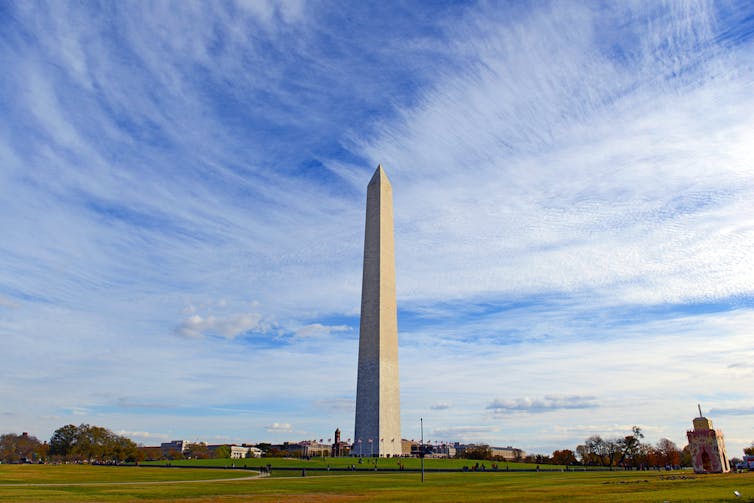United States Make America Great Again
No celebrities were booked for the United states of america's offset ever presidential inauguration, but then once more, they were hardly needed. There could be no greater celebrity than the human being coming to town to be sworn in as the country's first president.
On Apr 30, 1789, on the balcony of Federal Hall on New York City's Wall Street, George Washington took the oath to faithfully execute the office of president and to "preserve, protect and defend the Constitution". And now, after more than than 2 centuries of American history, he has a 43rd successor in Donald Trump.
The showtime and 45th presidents are as unalike as any two men could exist. Where Washington was e'er correct and reserved, Trump thrives on flouting convention; Washington's studied self-deprecation stands in stark contrast to Trump's puerile humbug. (Information technology's rubber to say Washington would never have used Twitter.) Yet there are certain parallels in their ascendancy to the presidency.
If many pundits today believe that the US is in final reject, then in 1789 many Americans and nearly Europeans doubted that the American experiment in republican government would last. The widespread enthusiasm that the Proclamation of Independence and struggle against King George had generated on both sides of the Atlantic just a decade before was all gone. "In a sense, both Washington and Trump were elected in the hope that they could make America great again".
Divided we fall
More than most incoming presidents, Washington was entitled to ask "what the hell was going on", in Trump's colourful language. The War for Independence had thrown the U.s. into a deep low, and created a monumental national debt that went unpaid. The earth'due south major economies were shutting their markets against American products and American services.
In the continental interior, the border existed only on inaccurate maps. European American settlers squatted on American Indian land and on occasion the Indians retaliated, sparking headlines about murders and abductions in eastern papers and secessionist sentiment in western hearts. In faraway North Africa, the Muslim Barbary states held American sailors and citizens every bit slaves for ransom.
Washington had to bargain with these and other issues with no regular army, no navy, no money and no credit. Where modernistic-day presidential hopefuls back-scratch favour with the electorate by thumping a bloated federal hierarchy, Washington's problem was the opposite: there was no bureaucracy whatsoever. The executive departments and the judiciary had non only to be filled, they had first to be created.

Despite such bleak prospects, Washington's two terms proved remarkably successful. Alexander Hamilton restored public credit and set up a productive revenue service. "Mad Anthony" Wayne won a decisive victory over the Native Americans at the Battle of Fallen Timbers. John Jay and Thomas Pinckney secured diplomatic treaties with Britain and Spain that secured the US's concur on the western borderlands.
Washington himself restored faith in the American experiment among his countrymen and in Us bonds among strange investors, and he won at least a modicum of respect from foreign governments. Eight years on from his inauguration, and with uncanny prescience, his adieu address identified internal segmentation every bit the only real threat to the future prosperity of the US.
Dawn and eclipse
The political history of the founding era habitually degenerates into the mindless worship of so-called "great men". It'southward truthful that Washington was a tried leader, and that his status as the saviour of his country made him broadly popular; it'due south also true that he picked able men for his chiffonier. But Washington'south statecraft was non a thing of supernatural talent; it was acute and practical.
Ane of its hallmarks was an unsentimental awareness of America'southward limitations. In a world of nifty powers, the US was a small-scale histrion. Similar their compatriots, Washington and his cabinet were convinced that America's twenty-four hour period would come, but they accustomed that their nation's glorious future could be easily scotched past brash actions in the present.
The Washington assistants was also willing to take its cue from other governments. Much more than the United states'due south national mythologies allow for, the young country was an emulator rather than an innovator: Hamilton found his models for reforming the public finances in Britain, and the ground forces was modelled on European institutions.
About of all, the U.s.a. nether Washington consistently and scrupulously adhered to the international police force of nations. The aim was that the federal government and the nation information technology represented would act as responsibly every bit a member of the Old World'south "family of civilised nations", and thereby join it.
The early 21st century is not the belatedly 18th century. The American economy may no longer be what it one time was, and the US'south soft and difficult power alike have been terribly undermined by the disastrous response to 9/11, just when the US acts and speaks today, it nevertheless does so as the primary architect and policeman of the present globe lodge.
It's far from clear whether Trump's unique make of statesmanship volition bring near a new dawn in America, or whether he'll go down in history as the president of the eclipse.
Source: https://theconversation.com/how-george-washington-made-america-great-again-71194
0 Response to "United States Make America Great Again"
Post a Comment